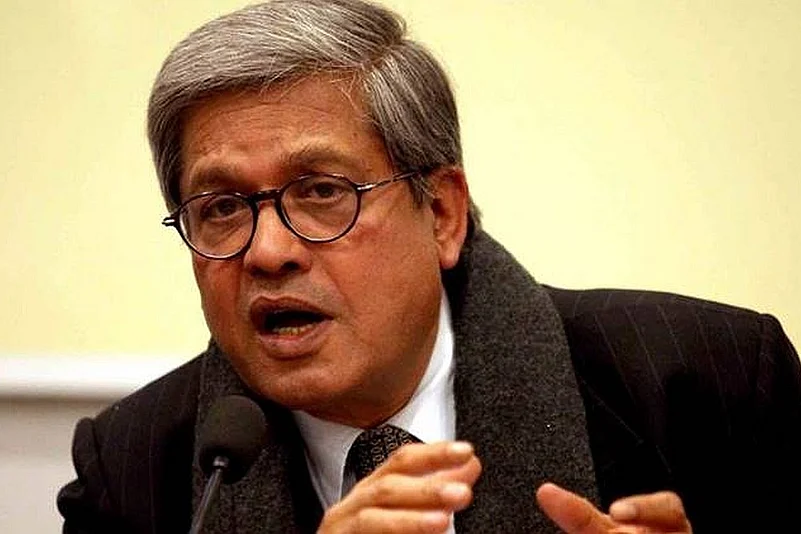Dileep Padgaonkar -- a friend to some, a mentor to many, and an iconic figure of Indian journalism, died yesterday after a brief illness. He was, briefly, the second most-important man in the country, according to the man himself.
Born in Pune in 1944, Padgaonkar did his schooling from St Vincent's High School and later graduated from Fergusson College in political science.He began his career in journalism at an early age and joined the Times of India as its Paris correspondent after receiving a doctorate in Humanities in 1968.
He served the paper in various capacities before he was appointed its editor in 1988, a post he held for six years. He also had a stint with UNESCO between 1978 and 1986 which exposed him to Bangkok and Paris.
Advertisement
Padgaonkar was appointed as one of the members of the three-member interlocutors group on Jammu and Kashmir, set up by the government after continuous unrest in the Valley in 2008.
Editor-in-chief of Outlook, Rajesh Ramachandran, who worked with Padgaonkar says:
Padgaonkar was the Executive Managing Editor of The Times of India when I joined the paper in 2000 as a special correspondent. The only question he asked me during the brief interview was about my school, which obviously didn’t impress him. But much later, I was surprised to see his assistant bring me a set of Tagore books. The books were his way of saying thank you for the biriyani we had at the club where he was a speaker at a journalism event. He was courteous to a fault.
Advertisement
I'll never forget having a drink with him at a colleague’s house warming party. When he got going the listeners would be in splits. He was an amazing story-teller. And he had lots to tell about a lot of interesting people. He is probably the best conversationalist I have ever come across. As a journalist he was erudite, classy and very flexible, and as an editor, he rarely interacted with reporters, at least, during his last stint.
Writing for DailyO, senior journalist Rajdeep Sardesai called Padgaonkar his first editor and one that entrusted him with heading the TOIs bureau in Mumbai. He writes: “Padgaonkar showed the ability to navigate the Times of India through a difficult period by stressing on the values of tolerance and mutual respect for contrarian ideas”.
“The Times of India under Padgaonkar was a sheltering umbrella where civilised dialogue was possible. Which other paper would have accepted diverse views like Swapan Dasgupta, Arvind Das, Chandan Mitra, Praful Bidwai, Achin Vanaik under one editorial roof so readily?”
Former editor of The Hindu and current editor of The Wire Siddharth Vardarajan said it was a terrible loss and remembered Padgaonkar’s influence on his life in apiece he wrote on his website.
Varadrajan likened him to an eclectic mix which had the best of his peers: “He shared Sham Lal’s passion for the world of letters and ideas and Girilal Jain’s keen eye for politics. He was an internationalist like Frank Moraes but also a statist in the tradition of B.G. Verghese – an editor who felt he had a better sense of what was in the national interest than the politicians and bureaucrats who made up the ‘establishment’”.
Advertisement
“He had a sense of humour as wicked as that of Khushwant Singh and was a raconteur nonpareil. He was a connoisseur of Hindustani classical music and wrote knowledgeably about food. A man of great learning and culture, he was a Francophile and a Maharashtrian in equal measure.”
And writing for the TOI, senior journalist Gautam Adhikari, a friend of Padgaonkars who had served with him at the paper for long, also put his thoughts down. Adhikari elaborated on what gave Padgaonkar the edge when he came into the business and how his reportage brought a new dimension to the daily paper at the time.
Advertisement
“For Dileep, the western half was essentially French. He loved Paris, intellectually and romantically. He went to France at a young age, pottered around in odd jobs, learned to speak flawless Parisian French and while in the Sorbonne to earn a doctorate, was appointed by the late Sham Lal, editor of this newspaper in the 60s and 70s, as The Times of India's Paris correspondent. His coverage was stimulating for those of us in the pre-internet and pre-global television era who wanted to understand the world a bit better through reading.”
A lot of the who’s-who also took to Twitter to pay their tributes to Padgaonkar:



















